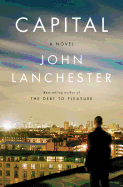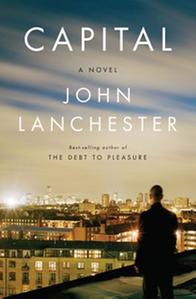
 John Lanchester, best known in the U.S. for The Debt to Pleasure, a lithe novel of delectation and dissimulation, has written a much heftier novel of socio-economic reportage in Capital. Set during the financial implosion of 2008, Capital uses an omniscient perspective and very short chapters to dip into the lives of diverse residents and workers along Pepys Road, a fictional street in a comfortable South London neighborhood, with an emphasis on their aspirations and anxieties. Into this multi-racial, multi-class study, Lanchester inserts an Iris Murdochesque plot twist, as each home owner is targeted by postcard photos bearing the typed message, "We Want What You Have."
John Lanchester, best known in the U.S. for The Debt to Pleasure, a lithe novel of delectation and dissimulation, has written a much heftier novel of socio-economic reportage in Capital. Set during the financial implosion of 2008, Capital uses an omniscient perspective and very short chapters to dip into the lives of diverse residents and workers along Pepys Road, a fictional street in a comfortable South London neighborhood, with an emphasis on their aspirations and anxieties. Into this multi-racial, multi-class study, Lanchester inserts an Iris Murdochesque plot twist, as each home owner is targeted by postcard photos bearing the typed message, "We Want What You Have."
Capital's assemblage of characters feels very schematic (as if Lanchester had selected one each from the most emblematic of zeitgeist types), but the astute narration, touching on everything from the vodka preferences of Polish house painters to the grassroots politics of detention centers to the clauses in soccer phenom contracts, lends a reassuring air of novel verité. (The significant characters are too numerous to itemize, but they are evidence of Lanchester's ambition and scope.) Less rapacious than Tom Wolfe's The Bonfire of the Vanities, Lanchester's work is more a novel of plight and identity, though those identities tend toward the bloodless when the characters' lifestyles are given more prominence than their hearts and minds, as is sometimes the case with Capital's posh banker and his label-crazed wife.
Lanchester cleverly uses the poison-pen postcards to explore the issues of personal expression and police surveillance in times of resentment and paranoia; the resolution exploits more than one skein of the narrative and contains a credible nod toward a real-world individual.
The chief bonus of reading Capital is gaining Lanchester's insight into the diverse ways in which modern Londoners strive to cope with property value insanity, unpredictable employment and evolving multiculturalism (it's a credible Baedeker of current British society). The novel dramatizes the personal side of the high-finance folly Lanchester explained so well in his nonfiction book I.O.U.: Why Everyone Owes Everyone and No One Can Pay (2010). As Capital both shows and tells, life in London in the early 21st century is a far broader and more complex picture than bowler hats, brollies and Burberry macs. --Holloway McCandless
Shelf Talker: A reportage-style novel that captures the economic and racial diversity of waning-boom London through the residents of a single road.

